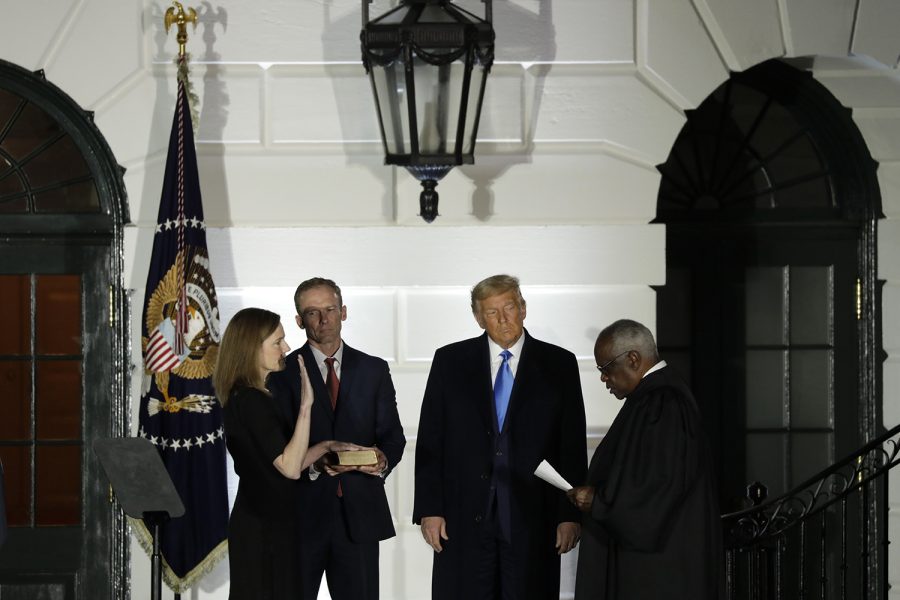Guest Opinion | Originalism and Justice Amy Coney Barrett
Originalism is not being represented in a fair context regarding the now-sitting Supreme Court Justice Amy Coney Barrett.
Judge Amy Coney Barrett is sworn in as the Supreme Court associate justice by Justice Clarence Thomas as her husband Jesse Barrett and President Donald Trump look on during a ceremony on the South Lawn of the White House in Washington, D.C. on Oct. 26, 2020.
November 10, 2020
Since 2017, when then-professor Amy Coney Barrett was appointed to the United States Court of Appeals for the 7th Circuit, many rightly assumed her to be President Trump’s next Supreme Court nominee. With now-Justice Barrett’s confirmation to the United States Supreme Court, the debate surrounding her views has only intensified. Much of this debate has focused on her judicial philosophy: originalism. But there is a lot of confusion as to what originalism is.
Simply put, Originalists believe the Constitution should be interpreted in light of its original public meaning, except as modified by subsequent amendments or laws. For example, take the 8th Amendment, which says that there shall be no “cruel and unusual punishments.” What does that mean? An originalist says: “well, what did ‘cruel and unusual mean in 1791 when the 8th Amendment was adopted?” It meant any punishment crueler and more unusual than hanging. Therefore, the Constitution does not prohibit capital punishment. But people are always free to pass laws prohibiting the death penalty. Twenty-two states have democratically decided to do just that. Just because the Constitution doesn’t make something illegal doesn’t mean the people acting through the democratic process can’t.
However, the public conversation concerning originalism has been dishonest. Originalism has been deliberately caricatured and misrepresented as some ghoulish late-night horror movie monster. Social-media platforms are replete with references to originalism as being nothing more than a thinly veiled conservative attempt to roll back the social progress our country has made over the centuries. Nothing could be further from the truth. In fact, perhaps the most well-known originalist scholar is a child of immigrants, registered Democrat, Hillary Clinton voter, and Yale Law Professor Akhil Ahmar. Originalists are not trying to resurrect the 3/5ths compromise (the Civil War Amendments in 1868 repealed that provision), revoke women’s suffrage (the 19th Amendment establishes this), resegregate the schools (there is a strong originalist argument for why Brown v. Board was right), or otherwise undo the social progress America has made in the last century. We aren’t pro-slavery, anti-woman, anti-change, or anti-anyone.
No, originalism is not new; it was how everyone interpreted the law for centuries. In fact, the most infamous moments in Supreme Court history have been when the Court departed from originalism: Dred Scott v. Sanford, Plessy v. Ferguson, or Korematsu v. United States. Each of these cases demonstrate the danger in going beyond the original understanding of the Constitution’s language. Empowering judges to shape society sounds appealing up until the judges don’t agree with you.
No, originalists do not want to drag society back to 1789, 1791, 1868, or any other time. Of course, society changes all of the time; and that’s great. Originalists simply contend that this change should occur democratically. There are plenty of liberties not protected by the Constitution that are nevertheless worthy of protection. We want to protect democracy and the structural integrity of our democratic institutions, not empower unelected, life-tenured judges to control American life and culture. Originalists want to restrain unaccountable uses of power. When Congress or the President makes a mistake, it only needs to last until the next election. We can fix it with our vote. When the Supreme Court oversteps, only the Court has the power to correct it. Originalist want to limit the power of the courts to make potentially life-altering mistakes that are beyond our power to remedy.
—Michael Needle, 1L, University of Iowa College of Law



